Updated: July 24, 2025
In recent years, more Americans than ever are making the move to Portugal, and it’s easy to see why.
With its mild Mediterranean climate, vibrant culture, and lower cost of living compared to the US, Portugal offers an appealing new life abroad.
This comprehensive guide answers all the questions you may have about moving to Portugal from the USA, but it is also useful if you are considering moving from any other country.
We will walk you through everything you need to know, including visa options, cost of living, taxes, healthcare, and what life is really like as an expat in Portugal.
Why Move to Portugal from the US?
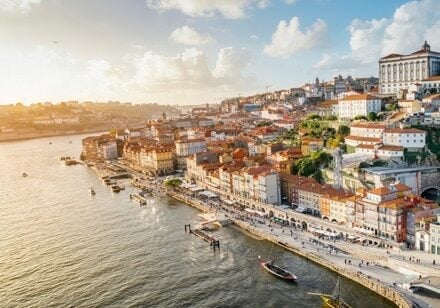
But why consider moving to Portugal? There are a wide range of reasons for moving, including:
- Safety and political stability, ranking seventh in the 2025 Global Peace Index
- Affordable and high-quality healthcare and education
- Lower living costs compared to the USA and other Western European countries
- Rated the best retirement destination in the world
- Stunning natural beauty, including golden beaches and gorgeous landscapes
- One of the most LGBTQ+ friendly countries in the world
- Rich cultural environment
- High global ranking in the 2024 English Proficiency Index (ranking sixth globally)
- Top choice for US citizens seeking a second passport, offering EU membership, a fast and straightforward pathway to citizenship, and flexible visa options
Which Portugal Visa is right for you? Visa Options for US citizens
The Portuguese government makes it easy to immigrate to Portugal from the US, and other countries around the world, through its various visa options.
Below, we give a brief overview of some of the most popular visa options, but this is by no means an exhaustive list.
 D7 visa
D7 visa

In order to be eligible for the Portugal D7 Visa, you must be able to meet the requirements outlined below:
- Be a non-EU/EEA/Swiss national
- Earn a passive income of at least €870 per month (as mentioned above, this passive income can come from different sources)
- Have a clean criminal record
- Show proof of a residential address where you will be living in Portugal
- Reside for more than 183 consecutive days per calendar year in Portugal
 Digital Nomad Visa (D8 Visa)
Digital Nomad Visa (D8 Visa)
The D8 Visa is an increasingly sought-after option for moving to Portugal as an American, or from another non-EU country. Also known as the Digital Nomad Visa, this option is designed for individuals who want to live and work remotely in Portugal.
Digital Nomad Visa requirements include:
- Being from a non-EU or a non-EEA country
- Be self-employed or employed by a business with a location outside of Portugal
- Earn four times the minimum wage in Portugal, which currently amounts to around €3,480 per month
 D2 visa
D2 visa

It caters to entrepreneurs, freelancers, and independent service providers, offering them a pathway to reside in Portugal while pursuing their business ventures.
Portugal D2 Visa requirements include:
- Having a Portuguese NIF tax number
- Opening a Portuguese bank account
- Proof of a self-employment agreement with a company based in Portugal (if applying as a freelancer)
- A business plan (if applying as an entrepreneur starting or expanding a business in Portugal)
- Proof of sufficient financial means to support your business venture and yourself in the country
- Hold a clean criminal record
 Golden visa
Golden visa
The Portugal Golden Visa residence permit enables you to settle, work, and study in Portugal.
To qualify for the Portugal Golden Visa program, you must fulfil the following requirements:
- Have a clean criminal record
- Be either non-EU, non-Swiss, or non-EEA national
- Minimum investment of €250,000, with a range of investment routes to choose from, including investment or donation in the arts or reconstruction of national heritage, scientific research, and the creation of ten jobs
- Meet all legal requirements, including an average of seven days spent per year in Portugal, guaranteeing a total of 14 days during the validity of each residence card (two years)
Regardless of the visa you choose, you will have the opportunity to apply for permanent residency or Portuguese citizenship after holding your residency permit for five years.
Most visas also allow family members to join you. Eligible family members include spouses, dependent children, and financially dependent parents.
If you would like advice on which visas you qualify for, chat to our immigration partner, Global Citizen Soultions, for expert guidance.
Below, we summarize and compare each visa mentioned:
Visa Type | Best For | Financial Requirements | Path to Citizenship | Family Inclusion |
D7 Visa | Retirees, passive income earners | Passive income of €870 per month (about $1,000) | Eligible for citizenship after 5 years of residency | Yes |
Digital Nomad Visa (D8) | Remote workers | Income of €3,480 per month (about $4,050) | Eligible for citizenship after 5 years of residency | Yes |
D2 Visa | Entrepreneurs, freelancers | Business plan + sufficient funds | Eligible for citizenship after 5 years of residency | Yes |
Golden Visa | Investors | Minimum €250,000 – €500,000 (about $291,000 – $582,000) investment | Eligible for citizenship after 5 years of residency | Yes |
How to Apply for a Portuguese Residence Permit

- A completed application form for your visa type
- Valid passport, ID, or other valid travel document
- Proof of sufficient funds in your bank account to support your stay in Portugal
- Proof of accommodation, such as a lease agreement or invitation letter
- Private health insurance
- Police clearance certificate or document to show no criminal record
Depending on the visa, other required documents may include an official job contract, business plan, etc.
Once you have gathered your documents, the process to apply for residency is quite simple:
Step 1: Apply at a Portuguese Consulate
Book an appointment at a Portuguese consulate or embassy. Submit your documents, pay the visa fee (around €75-90 / $88-105), and wait for your application to be processed. Some visas may take longer to process than others.
Step 2: Receive your entry visa
If approved, you’ll get your residency visa, which allows you to enter Portugal and begin the residence permit process.
Step 3: Enter Portugal and book an AIMA appointment
After arriving in Portugal, schedule an appointment with the immigration authority, AIMA, as soon as possible. On some occasions, your appointment will be scheduled when your visa is processed.
Step 4: Attend your appointment and get your residence permit
At your AIMA appointment, submit the required documents, your biometric data (like fingerprints), pay the fee (around €170 / $200), and receive your residence card.
Portugal Citizenship for Americans
Portugal also provides a straightforward pathway to citizenship for a US citizen moving to Portugal. Citizenship by naturalization is achievable through maintaining residency in Portugal. Becoming a citizen by descent or through marriage are possibilities, too.
Naturalization
You can become a Portuguese citizen by legally residing in Portugal for five years. This can be achieved through any of the Portuguese residency visas, including the Portugal Golden Visa residency by investment program.
In addition to the five years of residency, you will also need to demonstrate basic Portuguese language proficiency (A2 level) and maintain a clear criminal record.
Portuguese Nationality Law Update: June 2025
New changes to Portugal’s Nationality Laws have been proposed, where the residency requirement before applying for nationality may increase from five to ten years (or seven years for CPLP nationals). This is currently a draft proposal and is not yet officially law. Read the latest updates on the Portugeuse Nationality Law.
Marriage to a Portuguese citizen
You can become a Portuguese citizen if you are married to a Portuguese citizen for three years.
There is no need to live in Portugal, but you must prove a genuine connection to the Portuguese community and the marriage must be legally recognized in Portugal.
Ancestry (by descent)
You may be eligible to claim Portuguese citizenship by descent if a parent or grandparent was born in Portugal. This may also be extended to great-grandparents soon.
You’ll need documents proving your parental lineage, like a birth certificate of yourself and your Portuguese grandparent or Portuguese parent. Knowledge of the Portuguese language or proof of cultural ties may be requested for grandparent-based claims.
Dual citizenship in Portugal
Portugal allows you to become a citizen without giving up your original citizenship. However, you will need to check that your home country allows dual citizenship, too.
If it does, you can keep your citizenship status in both countries. If not, you may have to choose one.
Timelines for Portuguese citizenship
Gaining Portuguese citizenship usually takes one to two years after meeting residency requirements.
However, the wait is well worth it. The benefits of becoming a Portuguese citizen include an EU passport, freedom to live and work across the EU, voting rights, and permanent residence rights, no matter how immigration laws change.
Where to live: Best places in Portugal for Americans
If you are moving to Portugal from US cities, you are going to need a place to live. Portugal vs US real estate has some similarities, but there are also many differences.
Portugal’s regions and homes are embedded with culture and history, and each place has its own unique atmosphere and charm.
Lisbon
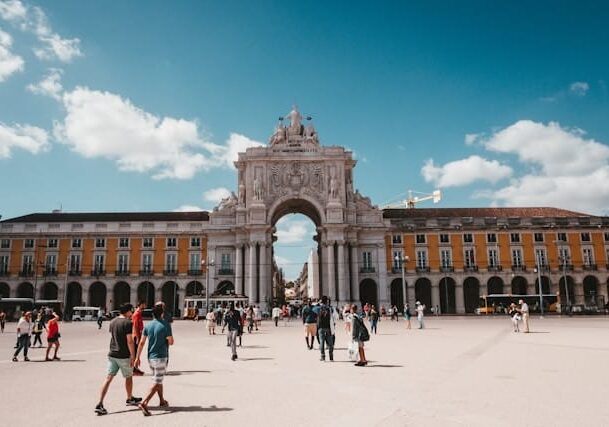
Also, most Portuguese locals speak English in Lisbon, particularly the younger generations, which makes it a favorite among American retirees and expats who are yet to learn Portuguese.
Avid travelers will also be able to jet around easily, with Lisbon Airport facilitating easy international travel, including flights to the USA. With the stunning Tagus River and the Atlantic Ocean nearby, you have many waterside properties and excellent beaches to enjoy.
It’s important to note that Lisbon is also Portugal’s most expensive city. Because living here is so sought after, property prices and living costs are quite high. Luckily, there are many other regions of Portugal that are just as fantastic to live in, so you’ll easily find more budget-friendly options if that’s what you are after.
Porto

It is less expensive compared to Lisbon, making it very affordable for US expats. Porto is a trending spot for Americans too, who enjoy the affordable cost of living and healthcare, as well as the relaxed and culturally-enriched lifestyle.
The Ribeira district offers waterfront houses in the historic quarter, while Foz do Douro is home to spacious properties that could be the perfect choice for families.
Algarve
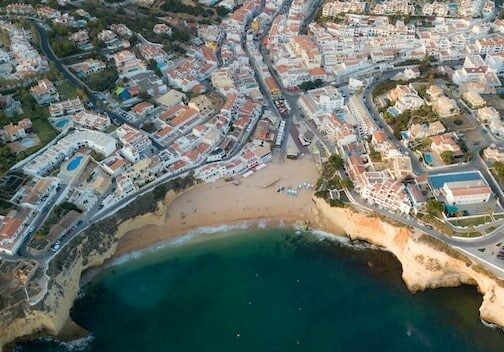
Many foreign residents call cities such as Faro, Albufeira, and Tavira home, with Lagos, in particular having become very popular with Americans.
The region is also home to many English-speaking locals, making it easy for a US citizen moving to Portugal to integrate into their new surroundings.
The Algarve is a favorite among US retirees because of its sunny climate (over 300 days of sunshine), outdoor coastal lifestyle, excellent healthcare system, and golden beaches.
Cascais and Estoril
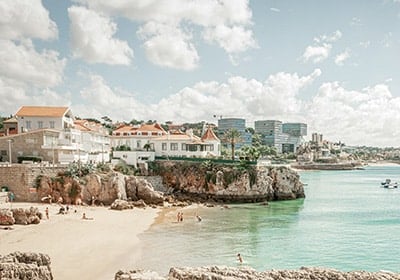
Families will find some of the best international schools in the country close by, while retirees will be able to embrace a high-quality lifestyle, enjoying their golden years in style.
You are just a quick train ride from Lisbon, too, bringing you the ultimate mix of seaside luxury and city convenience.
Coimbra
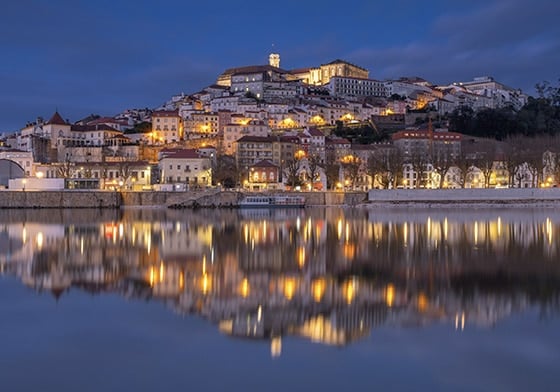
Coimbra has interesting historical architecture and culture on offer to make it the ideal option for Americans moving to Portugal.
The city is also home to Portugal’s oldest university, providing a lively, youthful atmosphere.
The countryside in the surrounding area would also make an exceptional home, with property prices that are very attractive to prospective buyers. Read our Coimbra real estate guide to get to know the property available in the area.
Madeira
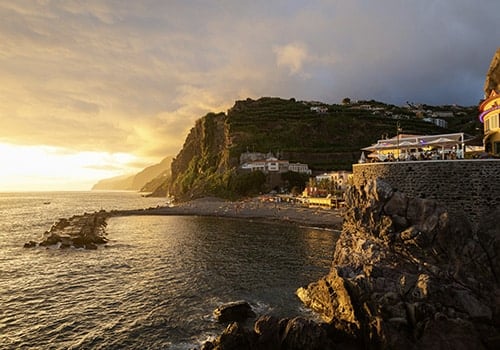
Funchal is Madeira’s main city, with a magnificent location and mild weather year-round. It is the best option for American retirees seeking an island paradise to settle in that still offers modern amenities, Portuguese charm, and gorgeous properties.
Read our Madeira real estate guide if you would like to learn more about the homes available on the island.
Renting or Buying Property in Portugal
In Portugal, accommodation costs are generally much lower than those in the US, regardless of whether you rent or buy a home.
If you compare Portugal with accommodation costs in another European country, you will also find prices to be quite reasonable.
Below, we provide an overview of rental costs and costs related to buying property in Portugal.
 Renting vs buying in Portugal
Renting vs buying in Portugal
The rent of a one-bedroom apartment outside the city center in Lisbon is $1,660 (€1,417), while a three-bedroom apartment in the city center is $3,080 (€2,630). Lisbon, the Portuguese capital, is by far the most expensive city in Portugal. And in Porto or the smaller cities, you will find prices much lower, although prices have been increasing steadily in Porto in recent years.
If you’re thinking of moving to Portugal to retire or relocate long-term, then buying property in Portugal will be a smart investment decision. There are no restrictions for foreigners buying properties in Portugal.
One good thing to know is that housing prices in Portugal are more affordable than what you would spend on property in the USA.
Average asking prices for property in Portugal are:
- Lisbon Metropolitan Area: €4,935 per square meter
- Porto Metropolitan Area: €3,937 per square meter
- Algarve: €4,385 per square meter
- Alentejo: €3,181 per square meter
- Northern Portugal: €1,903 per square meter
- Central Portugal: €2,098 per square meter
Seeking the assistance of a real estate agent, or preferably a buyer’s agent, is one way to ensure a smooth process. They will be able to guide you through the steps, from sourcing through to acquisition and beyond.
Chat with our team at Goldcrest, Portugal’s oldest buyer’s agent, to find out how we can help you buy property to relocate. We will also be happy to help you find a fantastic home to rent.
 Getting a mortgage as a foreigner
Getting a mortgage as a foreigner
Getting a mortgage in Portugal as a foreigner is relatively easy, as long as you can prove your affordability and financial stability.
Foreigners, including Americans, can get mortgages from Portuguese banks, usually up to 60 to 80 percent of the property’s value, with a deposit required to make up the rest of the amount.
Cost of living in Portugal vs the US

Considering this, you can imagine that a move to Portugal from the US leaves many people with a quality of life far higher than they would be able to afford back home.
Regarding your weekly shop, as long as you do not buy any expensive imported goods, your food budget will be noticeably less than in America.
Budget example for a single person
Below, we provide an estimate of your monthly living expenses for a comfortable, modest lifestyle in a major city like Lisbon:
- Rent for a one-bedroom apartment outside the city center: €1,100
- Utilities, mobile, and internet: €180
- Groceries and dining: €300-400
- Transport: €40
- Entertainment: €100-200
Your total estimated monthly expenses would be around €1,700 to €2,000, depending on your personal lifestyle choices.
Working in Portugal
Portugal caters to a variety of lifestyles and goals, whether you are moving to Portugal from the US as a digital nomad, career-seeker, or entrepreneur.
 Remote work and digital nomads
Remote work and digital nomads
Portugal is a top choice for remote workers and digital nomads, thanks to fast internet, a great lifestyle, and accessible visa options. High-speed fiber is widely available, and coworking spaces are common in cities like Lisbon, Porto, Braga, and Aveiro.
Active digital nomad communities host regular meetups, making it easy to network and settle in. Many US citizens in Portugal continue working remotely for American companies, allowing them to earn US-level salaries while benefiting from Portugal’s lower cost of living.
 The job market for English speakers
The job market for English speakers
Portugal’s job market is quite diverse, and while some industries can be competitive, there are still many opportunities available.
The tourism and hospitality industries are quite prominent in the Portuguese job market, along with tech and IT jobs.
Speaking English also gives you the upper hand when applying for these jobs, as strong communication skills are highly sought after.
 Starting a business in Portugal
Starting a business in Portugal
Starting a business in Portugal can be a good idea, particularly in the technology and tourism sectors, due to the country’s supportive environment, strategic location, and access to the EU market.
Portugal offers a business-friendly environment with various funding opportunities for startups. Lisbon, in Particular, has a thriving startup and entrepreneurial scene and plays host to the Web Summit, the world’s largest tech conference, each year.
Healthcare System in Portugal
The Portuguese healthcare system is not completely free. However, medical bills are cheaper when compared to the US.
Those who are under the age of 18 and above the age of 65 enjoy free healthcare in Portugal.
Public healthcare access for non-EU residents

These public facilities are well equipped and run efficiently, although you may experience longer waiting times compared to private facilities, especially when waiting for specialist treatment.
The SNS offers medical care at low or no cost, depending on your situation. Individuals with Portuguese residency and Portuguese citizens can register themselves in the public healthcare system.
Private healthcare options
Having private health insurance is essential for your Portuguese Visa application process. For a reasonably well-rounded private healthcare plan in Portugal, you can expect to pay around €120 per month ($133) for health insurance, which is significantly lower compared to the US.
Refer to our article on healthcare in Portugal to learn more about this subject.
Education in Portugal

There are 51 international schools in the country, mostly located in Lisbon, the Greater Lisbon Area, Porto, and the Algarve, and offering a range of curricula and languages, including, American, British, French, and German.
Prestigious international schools in Portugal include the Carlucci American International School of Lisbon, Nobel International School Algarve, St. Dominic’s International School, and Oporto British School.
For further education, universities such as the University of Lisbon, the University of Porto, and the University of Coimbra offer high-quality programs with affordable tuition.
Our article, International Schools in Portugal, offers a detailed understanding of the education system in Portugal.
Cultural integration and language
While many locals speak English, especially in major cities like Lisbon and Porto, learning Portuguese is the best way to get a deeper and more rewarding experience.
Basic language skills help with everyday tasks, and locals are usually patient and appreciative of any effort to speak Portuguese.
You can learn through language schools, apps like Duolingo or Babbel, or by joining local language exchange events.
 Cultural etiquette and social norms
Cultural etiquette and social norms
Portuguese culture places a strong emphasis on personal relationships and family, with multi-generational gatherings being common.
A relaxed approach to time is typical in social settings, and meals are enjoyed at a leisurely pace.
Politeness and formality are valued, with titles like “Senhor” or “Senhora” used for professionals and elders. Common greetings include handshakes or two kisses on the cheeks, starting with the right.
 Integrating and connecting with the people
Integrating and connecting with the people
Building connections is easy in Portugal, with lots of opportunities to meet and get to know new people.
Expat groups on platforms like Facebook are good places to start, where you can find events for newcomers.
Volunteering, attending local festivals, joining sports clubs, or taking cooking classes are also excellent ways to meet locals and immerse yourself in the culture.
Banking, taxes, and financial setup
Moving to Portugal from USA soil, or any other country for that matter, means new banking systems, tax filing, and ways to handle your finances. Below, you’ll find the basics to get you started.
Opening a Portuguese bank account

When you have secured your NIF number, opening a Portuguese bank account is usually easy and straightforward. When banking in Portugal, you have a range of options, from online banks to more traditional banks, including many that offer mortgages to foreigners.
Some of the best banks to consider getting a bank account in Portugal are Millennium BCP, Novo Banco, Banco BPI, and Banco Santander Totta.
Currency, cards, and money transfers
Portugal uses the euro (€). In urban cities, credit and debit cards are widely accepted, but in smaller towns or local markets, cash is often preferred. Generally, it’s always good practice to carry a bit of cash on you, just in case.
When exchanging your foreign currency, Multibanco ATMs are easy to find and generally offer better exchange rates than currency exchange offices. To save on international transfers or spending, you can use services like Revolut or Wise.
US tax obligations while living in Portugal
When relocating to Portugal, your taxes will follow you, too. No matter where you are moving from, it is always best to consult a tax professional to understand how your tax obligations will change.
In general, when living in Portugal as an American, the following tax implications will be important to know:
Portuguese vs USA tax residency and filing

Residents are taxed on worldwide income at progressive rates from 13 percent up to 48 percent. Non-residents pay a flat rate of 25 percent on Portuguese-source income.
Americans moving to Portugal also remain subject to US tax laws, including the requirement to file annual tax returns on worldwide income. However, the following provisions are available:
- Foreign Earned Income Exclusion (FEIE): You can exclude up to $130,000 of foreign income from US taxes in 2025 if you meet certain residency rules.
- Foreign Tax Credit (FTC): You can reduce your US tax bill by claiming credit for taxes you pay in Portugal.
- FBAR (FinCEN 114): If your foreign bank accounts total over $10,000 at any point in the year, you must report them.
- FATCA (Form 8938): If your foreign assets exceed certain amounts, you must report them to the IRS.
- Social security: A US-Portugal agreement decides which country you pay into, depending on how long you stay and where you work.
- Tax treaty: There’s a treaty between Portugal and the US to help avoid double taxation, but you still must file US taxes. Most expats use the FEIE or FTC to reduce what they owe.
Portugal’s NHR (Non-Habitual Resident) tax regime
The Non-Habitual Residence or NHR program in Portugal was a tax residency status that offered significant tax advantages. However, the NHR came to an end on 31 March 2025.
The program has been replaced by the Tax Incentive for Scientific Research and Innovation (IFICI), also known as the NHR 2.0 in Portugal.
The scheme is a ten-year tax-incentive program for highly qualified professionals in key economic sectors, such as science, technology, innovation, and education, who are moving to Portugal.
Under the new program, you will be subject to a special 20 percent personal income tax rate on Portuguese income and exemptions on certain foreign-sourced income, which includes:
- Foreign employment and self-employment income
- Foreign investment income, such as royalties, dividends, and interest
- Foreign capital gains
- Income from intellectual property
- Foreign rental income
Practical life setup
In addition to setting up your finances, there are a few other logistics to navigate when making the big move, like getting your pets and belongings into the country and setting up essentials like your internet and driver’s license.
Below, we provide an overview of what to expect when you relocate to Portugal.
Internet and mobile services
Portugal has a reliable internet infrastructure, with high-speed fiber internet. Coverage is excellent, especially in urban cities, with 4G/5G networks reaching over the majority of populated areas. Public Wi-Fi is also common in cafes and public spaces.
For an unlimited internet plan at a speed of 60 Mbps or more (Cable/ADSL), you’ll spend about €30-60 per month, depending on the contract you choose.
Driving and getting a license
If you are a US citizen, driving in Portugal with an American license is allowed for 185 days, thanks to a bilateral agreement between the US and Portugal. You can then exchange your US license for a Portuguese one without having to take a driver’s test in Portugal.
If you have a license from another non-EU/EEA country, you can generally drive in Portugal for up to 90 days. However, it’s a good idea to carry an International Driving Permit (IDP), especially if your license isn’t in English or Portuguese. After that, you’ll need to exchange it for a Portuguese one. Depending on your home country, this may involve taking a driver’s test in Portugal.
Bringing pets from the USA to Portugal

- You will need a European pet passport issued by an authorized veterinarian from the US.
- The pet must have a microchip.
- The pet must be vaccinated against rabies. If you have just vaccinated your pet, there is a 21-day waiting period before you can move your pet into the country.
- There are some breeds considered dangerous. In such cases, you need to sign a liability term and get a special permit from a local veterinarian.
Shipping belongings to Portugal
When transporting your belongings to Portugal, shipping by sea is the cheapest and slowest option. It will take one to three months to reach you. Air freight is the fastest and most expensive option, costing up to twice as much as sea freight. By air freight, your items will reach you within a week or two.
How can Goldcrest help you?
At Goldcrest, we’re here to help you find your ideal property in Portugal to make sure your move is stress-free from beginning to end.
Whether you have your sights set on the Algarve or are enthralled by the beauty of Portugal’s capital, we’ll provide insightful real estate expertise and strategic advice.
You can just sit back and relax as we do all the hard parts for you, from sourcing to property acquisition in some of Portugal’s finest locations.
All you need to do is contact us via the form below, and one of our friendly experts will be in touch.
Frequently Asked Questions about Moving to Portugal
How long can I stay in Portugal without a visa?
Americans can stay in Portugal for up to 90 days within a 180-day period without a visa, for tourism or short visits. If you plan to stay longer, you’ll need to apply for a residence visa.
Can I work on a D7 visa?
The D7 visa is not a work visa, but you will not be restricted from freelance working or self-employment in Portugal with the visa, as long as your passive income is your main income source. If you plan to work in Portugal, you could consider a different visa, like the Digital Nomad visa.
What's the best city for families moving to Portugal?
Cascais, just outside Lisbon, is very popular with expat families due to its safety, international schools, and outdoor lifestyle. Porto and Coimbra are also great family-friendly options.
Is Portugal safer than the US?
Yes, Portugal consistently ranks as one of the safest countries in the world, with low crime rates and a peaceful, relaxed lifestyle. For comparison’s sake, Portugal ranks as the 7th safest country in the world on the 2025 Global Peace Index, while the USA ranks 128th out of 163 countries.
Can I bring my dog to Portugal?
Yes, you can bring your dog as long as you follow EU pet travel rules, including microchipping, rabies vaccination, and the correct paperwork from a licensed vet.
How long does it take to get Portuguese citizenship?
You can apply for Portuguese citizenship after five years of legal residency, provided you meet other requirements like language proficiency.
Note: Nationality laws in Portugal may be changing to increase the minimum legal residency requirement to 10 years (or 7 for CPLP countries).
What are the main visa options for Americans moving to Portugal?
Popular options include the D7 Passive Income Visa, the D8 Digital Nomad Visa, the Portugal Golden Visa, and the D2 Entrepreneur Visa.
Is healthcare accessible for US expats in Portugal?
Yes, Portugal has an excellent public healthcare system and affordable private healthcare. Residents can access public healthcare, and many expats also use private insurance for faster service and specialized care.
Can I buy property in Portugal as a US citizen?
Yes, there are no restrictions on foreigners who would like to buy property. Americans can freely buy property in Portugal, and it can even support accommodation requirements for your visa application.
Can a US citizen move to Portugal?
Yes, with a valid visa, a US citizen can relocate to Portugal and apply for residency. Many Americans move for work, retirement, or simply to start a new life abroad.
Is moving to Portugal a good idea?
For many, yes. Portugal offers a high quality of life, great weather, safety, affordable healthcare, and a welcoming culture. However, it’s important to plan your move carefully and understand the residency requirements.
How much money do I need to immigrate to Portugal?
This will depend heavily on the visa you are applying for. For example, the D7 Visa requires proof of stable passive income (around €870/month for a single applicant in 2025), plus a year’s worth of savings to support yourself initially. In comparison, Golden Visa applicants will require a minimum investment of €250,000.
Apart from this, you will also need money for flights, accommodation, shipping your belongings, and your day-to-day expenses. All of these costs will vary depending on where you choose to live, if you are moving with family, the size of your home, your everyday needs, etc.
How much money do you need to live comfortably in Portugal?
A single person can live comfortably on around €1,500 to €2,000 per month, depending greatly on location and lifestyle. Lisbon, Porto, and popular Algarve areas are the most expensive, while smaller towns and inland areas are more affordable and can significantly reduce your monthly budget.